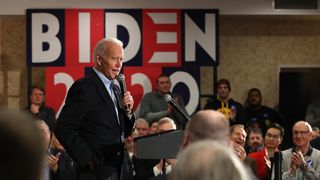COVID-19 is the greatest crisis President Trump has confronted in his presidency, and the pathogen is mightier than the tweet. Trump can't bully it into submission or humiliation, nor can he bury it with massive rallies of his vaunted base.
Americans have had a crisis of confidence in his leadership, driven by two factors: Trump's desire to minimise the danger - lest it reflect poorly on his leadership - and the failure of the health system's mechanisms to provide adequate testing, without which pandemic control cannot be attained.
"Relax, we're doing great, it all will pass," Trump told the nation on Sunday. It was not the most convincing message.
The mood in America today is dark and uncertain. Virtually all public activity has shut down, from conventions and meetings to political gatherings. The public squares that constitute America are empty. Churches, synagogues and mosques have closed their doors to their congregations. All major sport has been deferred.
It will only get worse before it gets better, and no one knows when it will get better.
Politically for Trump, as he faces the November election, there are several salient factors. Firstly, the President is seen to have failed to lead effectively during this crisis. His national address last week added to the sense of diminishing confidence and anger at his leadership. This is exactly what the markets reflected as Trump read the words from his teleprompter, but was unable to convince viewers that the state of the nation would get better with him in charge.
Further, President Trump's greatest asset going into the election has been the economy. The US will at least see a significant slowdown, and likely a recession and surge in unemployment. In terms of personal economic security, the closing of public activity and commerce means tens of billions of dollars in lost sales and wages. In just the last two weeks in the stock markets, Americans' super funds have lost upwards of 80 per cent of the increase in value they enjoyed since Trump took office.
Trump pays exquisite attention to the markets, and boasts of all the record closes in his tenure. The roaring economy kept swing voters in his column. His credibility as an economic manager is now under critical review by voters. President George H.W. Bush had over 80 per cent approval after the Gulf War, but with recession imminent in February 1992, his approval rating was where Trump's is today - well under 50 per cent. And he was defeated by Bill Clinton.
Presidents are assessed on how well they face crises: October 1962, John F. Kennedy and the Cuban missile crisis, when he stood up to the Russians and the threat of nuclear war, and stared Khrushchev down; George W. Bush and 9/11, when the president rallied the nation after an attack that saw 3000 Americans killed; then in 2005 with Hurricane Katrina, with a major city devastated for weeks and the White House unable to deliver effective relief, a failure which haunted the rest of his term.
The number of Americans infected with COVID-19 is likely to reach into the tens of thousands in coming weeks, with the fatalities expected to climb to the thousands. At its worst extreme, some project millions of cases in the next few months, with tens of thousands dying. This could be a crushing political burden going into the election. Trump never talks about these numbers - he prefers the Federal Reserve's interest rates, and cherrypicked Dow Jones point gains - but as president he will "own" the illness data.
For the Democrats, the race for the nomination is all but over and Joe Biden is on top. Just as he began, Biden's message remains strong: this is the time to end the assault on democracy that is the Trump presidency, the time to bring Americans together again, to restore civility to public discourse, and to reaffirm American leadership in the world.
Biden wants to show that he is capable - that he can step up from the moment he takes the oath of office to lead the American people into a more secure and hopeful future. Last week, his plan to fight COVID-19 compared favourably with Trump's program.
Sunday's debate with Bernie Sanders was very important - it was Sanders' last stand. He was very aggressive on Biden's record, though the vice-president was judged on how he stood his ground, kept his focus, and showed he is the more seasoned leader. He made a spate of sweeping promises during the debate, vowing to have a female running mate and to name an African-American woman to the Supreme Court. In response to the coronavirus outbreak, he called for immediate action, saying Americans "are looking for results, not a revolution". Biden was in command.
The big question as Biden closes out the remaining primaries and moves to clinch the nomination is: can Sanders graciously concede, and can Biden unite the Bernie forces with him? Sanders has two really important constituencies that Biden needs: young voters and Hispanics. His success in engaging them will be a real test for Biden as leader of the party.
Trump will undoubtedly be disappointed. After all, he was impeached for trying to damage Biden as a competitor, and now faces the man he feared most last year. The turnout in the recent Democratic primaries has seemingly shown a vote of confidence in Biden as the strongest candidate to defeat Trump. Ultimately, that is what the Democratic constituents want most, and the polls are indicating Biden is well within reach. Trump knows that - which is why he always wanted Bernie Sanders or Elizabeth Warren to be the nominee, because it's much easier to defeat a socialist than a patriot.






